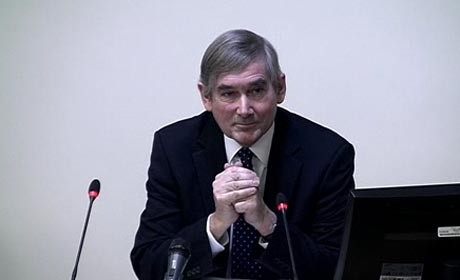
Richard Thomas told the inquiry had they have gone after journalists the 'impact on the office would have been very demanding'
The former information commissioner Richard Thomas has insisted his office did not have a policy to not "go after" journalists during its Operation Motorman investigation, but said "thank goodness" they did not pursue prosecutions given the likely impact on the organisation and its resources.
Giving evidence to the Leveson inquiry today Thomas is facing questions on the process of the office in pursuing evidence which emerged during Operation Motorman, its 2003 investigation, which was said to document “literally thousands of section 55 offences” under the Data Protection Act, with more than 300 journalists identified.
Earlier this week the former deputy information commissioner Francis Aldhouse denied claims made by a former investigative officer for the Information Commissioner's Office, Alexander Owens, that Aldhouse had said the newspapers "were too big" to go after for prosecutions.
Today Thomas concurred that he had "no recollection of him or anyone else using that sort of language".
Thomas was questioned on whether there was a policy decision not to prosecute journalists in the case, a statement which Thomas strongly denied, adding that it was only after the Blackfriars trial, the prosecutions which followed Operation Motorman, "was the possibility of going after journalists completely distinguished".
In the meantime he had focused on "the prevention" of any similar activity taking place, he said, although he accepted it was his "understanding" that journalists were never interviewed by his office.
Giving his recollection of the events Thomas said when he was first presented with the evidence obtained during the investigation he thought "there is a lot of material here which connects various material together" and that there was "certainly a general message that there was a lot of activity that began to show how various players were interconnected".
He added that it was "very serious" but that these ran "alongside many other serious matters" being dealt with by his office at the time.
"I have no recollection of discussing the investigation of journalists or instructing anyone in one way or another. It was not in any way a matter in which I was involved in or discussed and I would have remembered if asked.
"... I understood [the investigators for the ICO] would go ahead and do whatever needed to be done ... I assumed they would get on with the job."
While the "main focus of the case was on the middle men organising the illegal trade" Thomas insisted his legal team "were very much keeping alive the option of prosecuting journalists".
"Throughout 2003, right into 2004, even in early 2005 the question of what to do with the journalists was a very live question."
Leveson questioned why the issue of newspapers and journalists "wouldn't be a matter of great interest for you early on".
"Clearly I was aware this was matter which was serious and I was aware that there were implications straight away of where this might lead," Thomas responded.
"What I am saying is throughout 2003 my assumption was we might be prosecuting wherever the evidence led. It was quite likely we would also be prosecuting journalists, I did not give any serious consideration to that matter."
But he said he was told "some time in October or November that it was going to be too expensive to pursue journalists", at which point he took the issue to the Press Complaints Commission.
Described as his own speculation, Thomas said after being briefed that a case against the journalists would be "extremely difficult" he believed he "would have said something like 'we can't leave it there'".
He repeated the wording from his letter to the PCC, in which he says he is "considering whether to take action against individual journalists or newspapers ... the provisional conclusion is that it would be appropriate first to give the PCC the prior opportunity to deal with this issue in a way to put an end to unacceptable practices across the media as a whole".
"That is where I stood in November 2003. In effect what I am being told is it's going to be very difficult to pursue journalists, I am saying let's not leave it there."
Thomas was asked why a later note from ICO's counsel states that there was an understanding that "policy considerations have led to the view that enforcement of some sort rather than prosecution is the way forward in respect of journalists".
The former commissioner insisted "there is clear evidence there was not a policy conclusion at that point".
"My letter to [former PCC chairman] Christopher Meyer is saying the prosecution of journalists was still under consideration ... still alive. It was not anyone's policy that we were not going to prosecute journalists."
But he told the inquiry had they have gone after journalists, the "impact on the office would have been very demanding indeed".
"I can recall a conversation of saying thank god we didn't take the journalists to court, they would have gone all the way to Strasbourg".
He later said his focus was on trying to "deter" this "sort of activity" and for the issue to be "taken seriously".
Free daily newsletter
If you like our news and feature articles, you can sign up to receive our free daily (Mon-Fri) email newsletter (mobile friendly).









